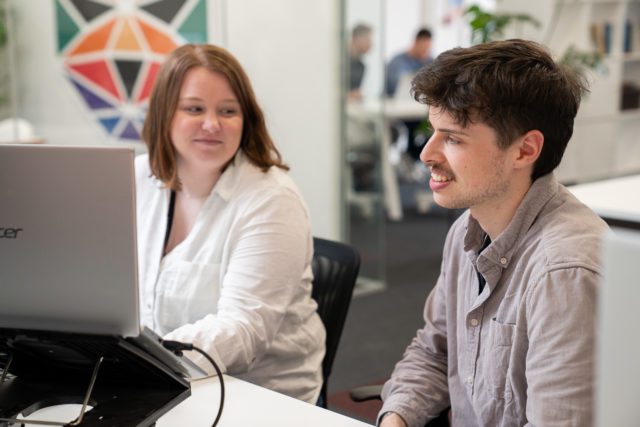If your local business has an online presence, you likely want to be found by local users. But how can you guarantee that your business shows up on relevant searches?
To rank better in your local area you will need to pay special attention to your SEO basics: Google Business Profile, structured data annotations, local citations and backlink profile. Read on to find out more about each of these areas and how to address them.
In this blog, we explore the essentials of local Search Engine Optimisation (SEO) to help you rank better in your area. But first, let’s get a clearer understanding of what local SEO is, and who it is relevant for.
Local SEO is an optimisation strategy that focuses on improving a business’s visibility in local search results. Local SEO is particularly relevant to brick-and-mortar businesses and services that operate in a specific area.
On most search engines (Google, Bing, etc.), results for search queries related to businesses, products, and services will often be tailored to the user’s location. For local search results, Google often shows three map results above the 10 organic links that most regular searches bring up. This is known as the Local Map Pack or Local Pack. If you own a brick-and-mortar business, part of the aim of your local SEO strategy will likely be to rank among the top three Map Pack results.

While our aim is to rank for local search results, the principles of Search Engine Optimisation we need to follow to achieve these results are much the same as we would for any other SEO campaign, but tailored to your local business’s needs.
Targeting the right keywords is essential. By optimising for keywords that your target users are searching for, you will be more likely to show up in their results.
Your target keywords should cover general terms that describe your business, like ‘tree surgeon’ as well as more specific terms that are relevant to your services. For our tree surgeon example, those may be; ‘tree cutting’, ‘hedge trimming’, ‘tree planting’, etc.
To take the guesswork out of keyword targeting, SEO experts use paid tools like Semrush and Ahrefs, which provide detailed insights into search volume and competitors’ rankings data. If you are doing your own keyword research, Google’s Keyword Planner can be used as a free research tool.
Once you have your keyword selection, map out the relevant keywords to pages on your website.
In doing keyword research, you may even find opportunities to create new pages. This may be the case if there are services with good search volume that you offer but don’t yet have a dedicated page on your website.
TIP: Don’t forget search intent. When choosing your keywords it is important to take into account the intent that search engines understand a keyword to have.
Put your keyword ideas into the search bar and look at the results. If you are not seeing Local Map Packs then the keyword is not understood by search engines to have local intent. If you are seeing lists and blogs rather than businesses and service pages come up for your chosen query, then the intent behind that keyword is likely informational, so you should target it with a blog rather than a service page.
Now that you have chosen your keywords, it is time to optimise the content on your website to target the relevant terms.
Title Tags and Meta Descriptions are the information that users see about your website in search results. They should include your target keyword for the page and may also include your location.

Your page content should also target your keywords and location while ensuring that the information provided is useful and relevant to users. Provide information about what you do, and the areas you serve. Include any information relevant to the local area, local case studies and verified reviews to back up your service.
TIP: Do not optimise your metadata and headings for ‘near me’ keywords. When doing your keyword research you may find that keywords like ‘tree surgeons near me’ have great search volumes. This does not mean that you should use that exact term in order to rank for it. Your job is to send clear signals of the service you offer and where. Search engines will do the work to connect the dots between a user’s location, their search terms, and the relevant businesses near them.
If you serve more than one area or have several physical locations, it is a good idea to create separate location pages for each area. Make sure that the content on each of these pages is unique and relevant to the location. That means including details like the unique store address for the area, opening hours, unique store or service information, details about how to reach the location, etc.
Learn more about targeting multiple locations in our dedicated blog, How To Target Multiple Cities Without Hurting Your SEO.
As we have explored above, a unique feature of local results is Local Map Packs. Appearing in these top results will make a big difference to your local visibility.
These three top results are links to relevant Google Business Profiles, so you will need to create and validate a Google Business Profile as a first step towards obtaining these results. Once your profile has been validated, we can move on to optimising it for success! Below are some of the key areas to remember when completing and optimising your profile:

You should also consider creating and optimising your Bing Places for Business Profile to ensure that you have better control over your online business presence. The good news is that you won’t have to do the work twice. You can sync Bing Places of Business with your Google Business Profile and import all the relevant data.
If you have more than one brick-and-mortar location you should create a business profile for each of these.
Make sure that all the profile information, including the description, photos, and opening hours are tailored to that location. Do not include your location in the Business Profile Title, your business name should be consistent across the board.
Structured data or schema is a standardised format used to provide search engines with organised information about the content of a website. There are many types of schema and correctly implementing it to your website can help your site gain rich results, like Map Packs and knowledge panels.
The type of schema most relevant for Local SEO is Organisation schema. There are several types of organisation schema, and you should aim to choose the most specific type of schema that aligns with your business.
By implementing organisation schema, you are providing search engines with essential data about your business in a structured manner that is much easier to read than parsing your website pages. To be effective for Local SEO, your schema should include your business name, website URL, logo, address, contact information, opening hours, reviews data, and area served (if relevant). You can also include information about your social media profiles and other relevant business information.
If your business has physical locations, you should implement Local Business Schema (a type of Organisation Schema) or the most relevant type within the Local Business Schema parent type. See the full list here.

Listing your business in relevant local and national directories is a good way of increasing your visibility, gathering citations, and establishing your online presence.
Start by finding local directories that are relevant to your industry and list your business in them. You can find these by looking at the directories ranking for your relevant service keywords and reviewing your competitor’s backlinks. You can also use free sources like this list by Moz to find popular citation sources based on your business category. Make sure that you provide complete and consistent information across every directory in which you list your business.
If you are already listed in directories and other online sources, you should review these listings to ensure that your name, address, phone number and website (NAPW) details are correct and consistent across every citation. This will help create connections between the different mentions and reinforce the fact that the information search engines have about your business is correct.
This becomes particularly important if your business has been online for some time and there have been changes to your address, contact details, core hours, and other key information during that time. Taking the time to find these citations and get them up to date will have a positive effect on your organic visibility.
Inbound links from relevant sources help build your authority and therefore improve your organic performance over time. While backlink strategies generally focus on gaining links from websites with high domain authority (DA) scores, local mentions and links to your website are more relevant for local businesses.
Linking opportunities can be found in a number of places, and gaining them is all about finding the right ideas and opportunities. You may explore opportunities like:
This is, of course, not an exhaustive list and link-building opportunities can come from very different sources depending on your industry. Working with an SEO specialist can make this task much easier, as they will have access to the tools and expertise needed to find the right opportunities and ideas.
Local Search Engine Optimisation is essential to the online presence of any local business. By following the advice above, you will be taking the first steps towards best practices and enhancing your chances to rank locally.
For even more essential information that will help you punch above your weight online, check out the Wildcat Digital blog.
Or, if you would prefer to leave the digital stuff to the digital experts, get in touch today to find out more about our local SEO services. Wildcat Digital is an award-winning agency that helps businesses of all sizes improve their online performance.

Founder
Our founder, Will Hitchmough, worked at a number of high profile Sheffield Digital Agencies before founding Wildcat Digital in 2018. He brings an extensive knowledge of all things related to SEO, PPC and Paid Social, as well as an expert knowledge of digital strategy.
Digital Marketing can be a minefield for many businesses, with many agencies ready to take your money without knowing how to deliver results. I founded Wildcat Digital to deliver digital success to businesses with smaller budgets in a transparent way.

Head of Growth
Rich joined us in May 2024 to head up our growth team. With years of experience helping other agencies to grow, Rich joins us at an exciting time as Wildcat is working on a five-year plan to become one of the biggest agencies in the UK.
Outside of work, Rich is a father to three children, which keeps him very busy! He’s also recently started running again to keep fit and loves a bit of DIY.

Head of Digital
Sarah joined Wildcat in January 2025, bringing over seven years of SEO expertise to the team. With a background in Fashion Communication and Promotion, she has worked both in-house and at agencies, covering a range of digital marketing specialisms before focusing on SEO.
Passionate about all things search, Sarah thrives on helping brands grow their online presence.
Outside of work, she enjoys walking her dog, running, and shopping for vintage clothing.

Office Manager
Amelia joined Wildcat Digital in January 2025, bringing extensive experience in HR, Health & Safety, Facilities Management and IT Support. Previously an Operations Manager at The University of Sheffield, she has a strong background in creating efficient and well-organized work environments.
Specialising in HR, Health & Safety, and Facilities Management, Amelia ensures the Wildcat Digital team has the resources and support needed to thrive. Whether managing office operations, maintaining compliance, or fostering a positive workplace culture, she keeps everything running smoothly.
Outside of work, Amelia loves trying new things, traveling, camping, and walking. She also enjoys socialising and exploring new places with friends and family. Her adventurous spirit and proactive approach make her a valued member of the team.

Client Success Coordinator
Siena joined us in 2023 with a background in sales and digital marketing. She leads on client relationships across the company, ensuring that our customers are happy throughout their journey with us, from their initial consultation through to onboarding and beyond.
Outside of work, Siena enjoys travelling and getting stuck into the local culture. She likes to make the most of her experiences and particularly enjoys watching sunrises and sunsets from beautiful locations around the world.

SEO Account Director
Paul has a strong background in SEO, having previously founded and ran a successful eCommerce business, as well as running a personal blog that achieves an average of 17K users per month. Paul’s knowledge of SEO is extensive, with a strong emphasis on client handling and technical SEO.
Outside of work, Paul enjoys spending time with his family and staying active with weight lifting and combat sports.

Team Lead & Technical SEO Account Manager
With a degree in Computer Science and SEO experience dating back to 2017, Dariusz has a wide range of SEO skills and knowledge. His specialist knowledge of Technical SEO has firmly landed him the title of Wildcat’s Technical Wizard, and he has recently taken on the responsibility of Team Leader for the Panthers Team.
In his spare time, Dariusz loves hiking, experimenting and trying new coffees and loves learning new things. He is currently learning more about CRO and AI and how this could benefit our clients.

Team Lead & Senior SEO Account Manager
With a background in sales, Molly is a natural Account Manager, brilliantly handling any issues that come her way. Having joined us as a Digital Marketing Executive, and working part-time through her final year of University, Molly is a shining example of how hard work pays off. She is now an SEO Account Manager with a particular interest in Content and Client Management.
In her spare time, Molly loves to get out in nature, hiking and exploring the Peak District. She also loves cooking and likes to unwind with a bit of yoga.

PPC Team Leader
Libby joined Wildcat in 2021 as our first PPC hire. With a degree in Digital Media Production, a Master’s in Digital Media Management and previous experience in Social Media Management, Libby hit the ground running and has since climbed the ranks to Senior PPC Account Manager and has a particular interest in the eCommerce sector.
Outside of work, Libby likes gaming, and cooking and likes to keep active by lifting weights.

Senior SEO Account Manager
With a degree in Film and TV production, and a varied career history, Jamie made the move to marketing with a Masters degree in Digital Media Management. He has since worked in SEO at Agencies across Sheffield, before joining Wildcat and working his way up to SEO Account Manager. Jamie has a particular interest in backlinks and Digital PR and has recently gained a client a valuable backlink from Forbes!
In his spare time, Jamie is an avid foodie and loves trying new restaurants and cuisines. He also loves to travel and spent a year travelling to Australia after university.

SEO Account Manager
Jasmine joined Wildcat in 2022 with a strong background in SEO and Account Management. At the time, she was finishing up a Level 4 Apprenticeship in Digital Marketing from the Chartered Institute of Marketing, and has since worked her way up to SEO Account Manager. Jasmine excels at content writing and promotion, and particularly enjoys finding creative ways to join the dots on multi-channel campaigns.
In her spare time, Jasmine volunteers at a charity, helping combat loneliness & social isolation experienced by older neighbours. Outside of Wildcat, she owns a catering company, Savery Grazing, creating delicious grazing tables & platters for a range of events. She also loves skiing and exploring the Peak District.

Senior SEO Executive
After spending ten years managing businesses, restaurants, cafes and event spaces across Sheffield, Jon decided to change careers and joined Wildcat as an SEO Executive in 2022. He especially enjoys the client management side of the job, helping them to understand digital marketing and ways in which they can build their business’s presence online.
Outside of work, Jon likes to keep fit with running, badminton and football, and also loves music.

Senior SEO Executive
Andy joined Wildcat in 2023 after starting his digital marketing career in-house for a local Sheffield company. Since joining, he has developed a strong interest in Technical SEO and has strong skills in Account Management.
Outside of work, Andy loves music and plays in a couple of bands. He also enjoys rock climbing, cycling, photography and good food.

PPC Executive
Before joining Wildcat, Tom worked across different industries, building skills in sales and customer service. He later developed a passion for digital marketing whilst working on personal marketing projects and freelance ventures, and gained numerous certifications in PPC and Social Media.
Outside of work, Tom enjoys staying active by going to the gym and hiking. He also loves travelling and motorbiking.

Senior SEO Executive
Kezia joined us in July 2024 after completing a CIM Certificate in Digital Marketing and gaining experience in Content SEO at another Sheffield agency.
In her spare time, Kezia loves to get outdoors, bouldering, hiking and travelling.

Senior PPC Executive
Alex joined Wildcat Digital in December 2024 as a Senior PPC Executive, bringing a strong background in Paid Media, Paid Social, and Programmatic advertising. With a degree in Business & Marketing and Google Ads certifications, she has the expertise to craft high-performing campaigns that drive results.
Before joining Wildcat Digital, Alex worked at two leading agencies in Leeds, honing her skills across various digital advertising platforms. Her analytical mindset and strategic approach help businesses maximize their online presence and advertising budgets.
Outside of work, Alex enjoys spending time with her dog, Lola, and going on walks with her dog walking group. She’s also a keen footballer and loves playing five-a-side whenever she gets the chance. Her enthusiasm and team spirit make him a great addition to the Wildcat Digital team.

SEO Executive
Amy joined Wildcat in 2024 with a background in journalism, having worked as a News Editor and Editor-in-Chief at The Sheffield Tab. She is naturally interested in Content SEO and research, so will no doubt prove to be a content power-house.
In her spare time, Amy loves watching crime shows, listening to music and hanging out with her dog, Eddie!

SEO Executive
Reiss joined the Wildcat Digital team in July 2025, with a background in journalism and digital content, Reiss brings both creativity and technical know-how to the team.
After graduating with a Journalism Studies BA from the University of Sheffield, where he also served as Games Editor and Deputy Editor for the student-run newspaper – Reiss jumped straight into the world of climate tech communications.
Outside of work, Reiss loves crochet, swimming, playing guitar, and diving into both video and board games. He’s always up for picking up new skills and trying new things – which makes him a perfect fit for our team!

Content & Proposal Writer
Liv joined the WildcatDigital Team in June 2025, with a strong background in financial admin and client care, Olivia is taking an exciting step into the creative world – and we’re so glad she’s doing it with us!
She’s currently studying content creation through her apprenticeship with Wildcat, and already bringing fresh energy and creativity to the team.
Outside of work, Olivia runs her own BIAB nail business, loves reformer Pilates, long walks, and is a member of a competitive dance team.

January 30, 2026
As content production increases across the internet, users are exposed to more information than ever before. As AI search features…

January 26, 2026
We made it to the end of January! One month into 2026, and it feels like a lot has changed.…

January 23, 2026
Many businesses assume that Author and Meet the Team pages are simply a nice way to showcase the people behind…